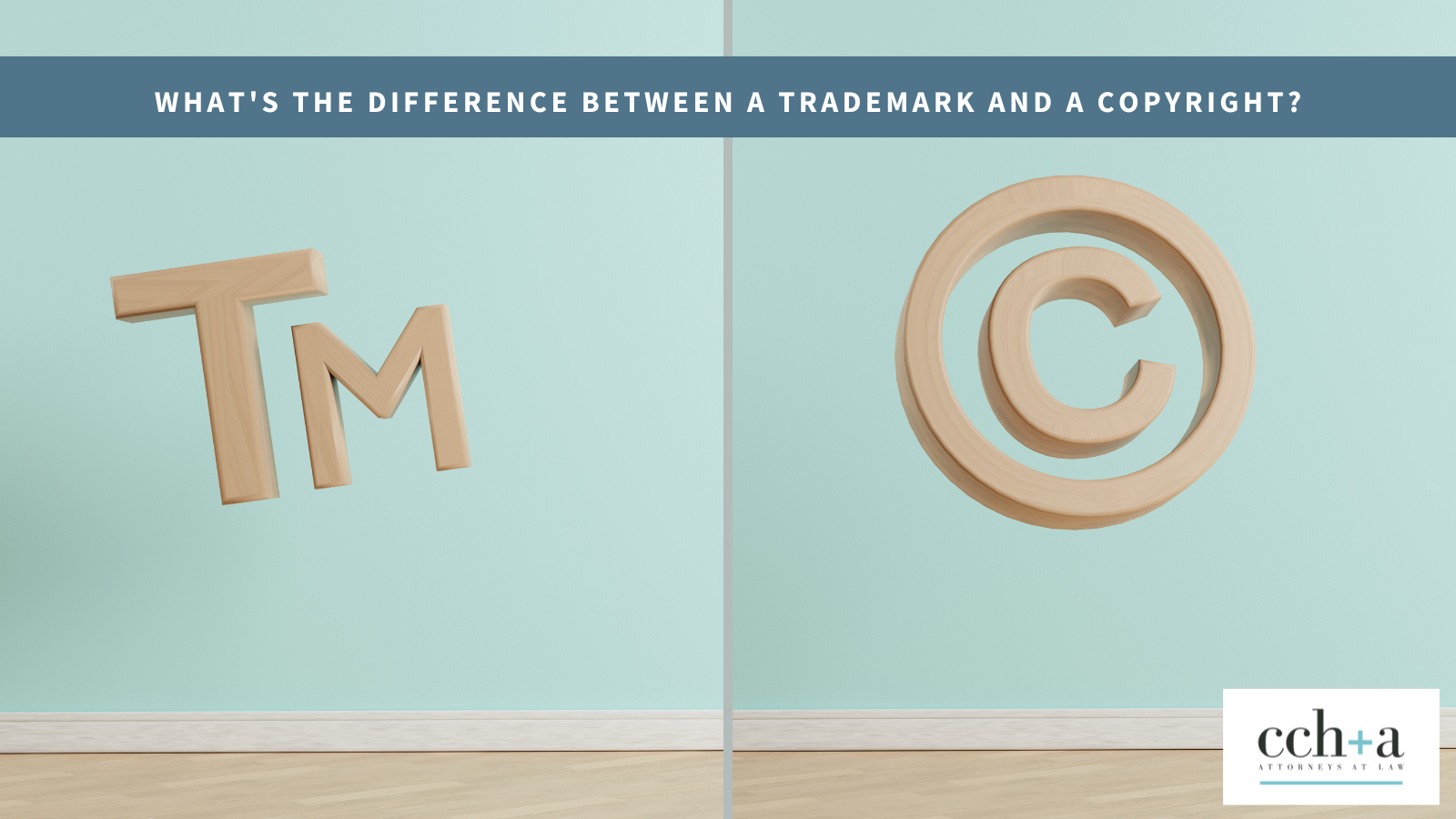What's the Difference Between a Trademark and a Copyright?

Author: Justin M. Hays
POST DATE: 7.26.22

Many businesses are uncertain as to whether they need trademark vs. copyright protection. In fact, circumstances often warrant both. This guide will clarify the difference between them as well as the benefits of obtaining federal registration of your intellectual property.

What Is a Trademark?
A trademark is a word, phrase, design, symbol, or combination of these things that distinguishes your goods or services from those of your competitors. Though the term “trademark” technically refers to goods while the term “service mark” is used for services, both types of marks fall under the umbrella of trademark protection.
Trademarks are important tools for building consumer recognition and customer loyalty. And common law protects your trademark once you use your logo with your goods or services in commerce. But your common law trademark is only enforceable in the geographic location where you use it.
Trademark Examples
Having a trademark does not mean you own a particular word or phrase and can prevent everyone else from using it no matter the circumstances. Rather, trademark registrations are always tied to the specific classes of goods or services under which you have registered your trademark.
For example, if you trademark a logo for a soda brand, you cannot prevent a car manufacturer from using a similar logo. Likewise, if you own a service mark for a beauty salon, it will not be enforceable against a gas station using a similar mark.
Trademark vs. Patent
Trademarks also serve a different purpose than patents. Patents provide intellectual property protection for inventions. So a patent would protect an inventor’s rights to a new kind of computer processor, while a trademark would cover the brand name and logo for the product.
What Is a Copyright?
A copyright protects an author’s or artist’s original works once they are fixed in a tangible form of expression. This means the work can be perceived, reproduced, or communicated for more than a short time. Copyright law protects an array of works, including books, video games, song lyrics, movie scripts, photographs, computer programs, and artwork.
It is important that the work is fixed and tangible because a copyright protects the expression of an idea, not the underlying idea.
How Do I Federally Register My Trademark or Copyright?
To register a trademark, you must file an application in the United States Patent and Trademark Office (USPTO). Once the USPTO registers your trademark, you must complete certain periodic renewal filings demonstrating consistent use of the mark to maintain your registration.
For copyrights, registration entails filing an application with the Copyright Office, which is part of the Library of Congress. Registered copyrights remain in effect for the author’s life plus 70 years after the author’s death.
Why Is it Important to Federally Register My Trademark or Copyright?
Unregistered copyrights and trademarks can be difficult to enforce against infringers. Although you have common law ownership rights in your copyright or trademark, a registered copyright or trademark provides much stronger protections against infringers. Registering your intellectual property also provides an array of benefits.
Nationwide Protection
A major benefit of registered trademarks and copyrights is they afford the owner nationwide protection. Businesses can obtain state-specific trademark registrations, but these registrations are only enforceable within the state’s boundaries.
Notice and Deterrence
A business may use the letters “TM” to indicate it is claiming a trademark or “SM” to provide notice of a service mark. After registration, the symbol ® after your mark alerts competitors that you have a registered trademark and thus, enforceable, nationwide rights to use that trademark. This can deter other businesses from using your mark or one that’s confusingly similar.
Likewise, a © or the word “copyright” followed by the author’s name and the publication date provides notice of a registered copyright. It can also deter others from plagiarizing your work.
When these symbols are prominently displayed next to your trademark or copyright, it makes it difficult for an infringer to argue they were not aware your trademark or copyright was registered.
Enforcement
While the owner of a trademark or copyright is responsible for enforcing their rights, federal registration can help. A registered trademark carries the legal presumption that you own the trademark and allows you to sue an infringer in federal court. For copyrights, you cannot initiate litigation to enforce your rights until your work is registered with the Copyright Office.
Potential for International Protection
There is no such thing as a worldwide copyright or trademark, but treaties provide for reciprocal copyright and trademark protection in many nations as long as the proper registrations are made following registration in the United States.
Is Federally Registering a Trademark or Copyright Important for E-Commerce?
Yes, it can be helpful. When online service providers are notified that a user is engaging in copyright or trademark infringement of a registered work or trademark, they take down the infringing content. Proper notice to the service provider must identify the copyrighted or trademarked material, so being able to give the service provider evidence of a federal copyright or trademark registration makes this step easier and may speed up the take-down process.
Do I Need an Attorney to Federally Register My Trademark or Copyright?
Hiring an experienced intellectual property attorney to help you file for trademark and copyright protection provides stronger protection to your trademarks and copyrightable works against infringement and provides you stronger remedies in the event of infringement.
Church Church Hittle + Antrim has been providing comprehensive legal services to businesses since 1880. We are here to help you determine if you need a trademark vs. copyright and to take care of applying for federal registration. Contact us today.